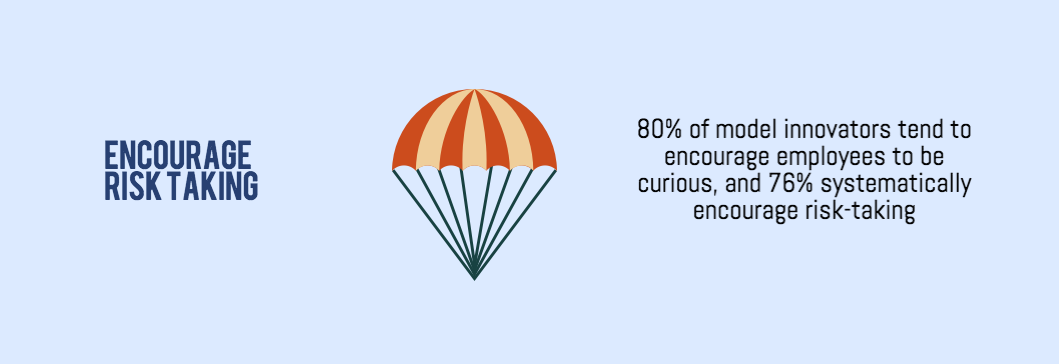Characteristics of Successful Innovators 🔗
Many people assume that if they don’t invent things and hold multiple patents, they aren’t very innovative. In reality, many inventors don’t have patents or products. Some innovators generate ideas, while others bring those ideas to reality.
Ultimately, innovators are motivated by change. They have the unique ability to come up with out-of-the-box solutions to everyday problems. When you view it this way, you may realize that you’re an innovator after all.

An Innovator’s Personality: Innovative Traits and Qualities 🔗
An innovator is someone who has the capacity to turn new knowledge and skills into a successful product or service. It could be in small or large forms, but (in general) it relates to introducing some form of significant positive change. They identify opportunities for improvement and act on them.
Although 84% of executives claim that innovation is critical to growth strategy, only 6% are satisfied with their innovation performance. One reason for this is that many executives and employees are trained to be managers and operators, as opposed to innovators.
No matter the role, great innovators share some key characteristics. If you’re looking to become a great innovator, these are the innovative qualities you can develop.
Valuing Innovation 🔗

Many organizations value stability and consistency over change, which can resist innovation. Innovators realize that innovation is the only way to remain truly competitive in the marketplace, and they share that feeling with others. As a result, they value innovation and help others to do the same.
Encourage Risk-Taking 🔗

Innovators realize that taking risks is part of making great discoveries and advancing society. Great innovators encourage others to do the same. In fact, 80% of great innovators encourage employees to be curious, and 76% systematically encourage risk-taking. A culture of risk-taking means encouraging new ideas and learning from failure, seeing it as an opportunity for growth rather than an occasion for punishment.
Teaching Others 🔗

Great innovators realize that new ideas and implementation can’t end with them. They bring others along for the ride. In this way, an innovator will build entire teams of forward-thinkers. 25% of C-level executives surveyed said they have a designated innovation leader, such as a chief innovation officer, and more than 40% stated they will create such a role to foster innovation in their cooperation. When innovation best practices and mindsets are shared widely, entire industries can benefit.
Starting Somewhere 🔗

Great innovators realize that they won’t know what ideas are worth pursuing until they try them. In fact, they’re not afraid of bad ideas because they know that good ideas are usually close behind! To become an innovator, begin with the idea you have and be open to learning more. According to Gartner, the main drivers for innovation today include enhancing the customer experience (53%), driving revenue growth (53%), and creating new products and services (45%).
Looking for Patterns Everywhere 🔗

Innovators are always on the lookout for solutions that exist in one industry that may help them with theirs, called analogous solutions. A perfect example is skis. A ski company wanted to reduce the vibration in skis as skiers turned at high speeds. They found an analogous solution in the music industry and appropriated technology used to stabilize violins to reduce the ski’s vibrations.
Staying Positive 🔗

As an innovator, you have to have a positive attitude and remain in high spirits, even when conditions are less than ideal. You can’t assume that something won’t work simply because it hasn’t been done that way before. Innovators realize that if you do what you’ve always done, you get what you’ve always gotten. Stay positive and you’ll see your new ideas take shape.
Incentivizing Innovation 🔗

Just like innovators take others under their wing to teach them how to innovate, they also incentivize those who are willing to innovate. Many companies simply don’t offer any incentive to innovation. Instead, build incentive programs that encourage and reward innovative ideas.
Being a Team Player 🔗

A great innovator realizes that teamwork requires collaboration and does his or her best to be a team player. Rather than being difficult mavericks, great innovators value the idea that we are better together. Look for people with big ideas who build teams to make them happen.
Connecting and Collaborating 🔗

In the Renaissance, our stereotype of the innovator as the lone wolf was formed. This was due to the technology of the time: Less than 10% of the innovation during the Renaissance was connected.
Now, a majority of breakthroughs happen in collaborative environments. Expect to work with others to see ideas come to life and to incorporate feedback and new approaches.
Valuing a Culture of Innovation 🔗

As an innovator, you realize that you can’t “go it alone” because you want and need the innovation and new ideas to go beyond your direct influence. Great innovators help create a culture of innovation across their whole organization to maximize their reach. Having a culture of innovation benefits not only an organization but the industry and even society as a whole.
Being an innovator means a lot more than being Benjamin Franklin or a mad scientist. Day to day, great innovators encourage risk-taking, teach others, collaborate and build teams, and much more. Do you see yourself as having the characteristics of innovation necessary for long-term success?
Traits of a successful inventor 🔗
From Leonardo Da Vinci to Thomas Edison, there have been many famous inventors throughout history. But what sets apart the ones who made it from the ones who didn’t? Here are a few of the qualities of inventors to keep in mind.
Imagination 🔗
Inventing is all about problem-solving. Great inventors understand that it all starts with a vision for how things could be made easier. Instead of problems, they see potential. Instead of challenges, and find creative solutions.
Patience 🔗
For inventors, patience is paramount. It also plays a role in weighing the pros and cons inherent in each major invention decision. They capture details of their innovative idea, research it, sketch it out, and build a prototype.
Passion 🔗
The passion for breaking barriers and continuously tweaking their innovation is a critical part of seeing ideas come to fruition. Passion is a driving force to keep discovering and driving towards accomplishing a set goal.
Competitiveness 🔗
Competition has helped shape some of the most successful inventors in the world. Inventors consistently seek new ways to outpace the competition and better themselves in the process.
Be an innovator 🔗
Start by learning. Just being curious can lead to new opportunities and new ways of doing things. Next, start to make suggestions to those around you. Innovators rarely deliver on their ideas by themselves. And, of course, once you’ve shared an idea, you’re that much more likely to follow up on it.
Infographic 🔗



